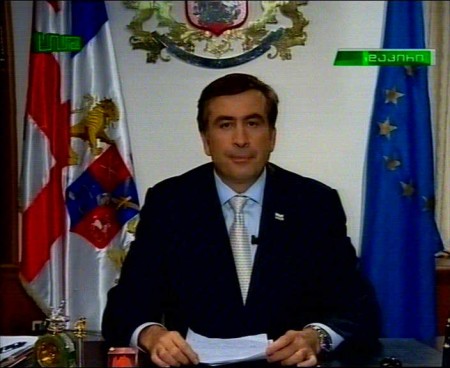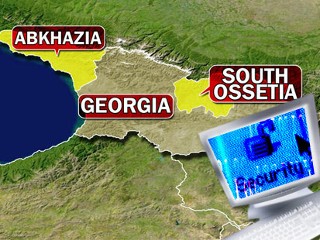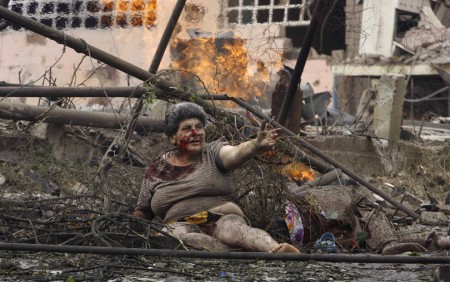I woke up to discover a weird link to a Digg post sent over by a friend of mine. It was a poll conducted on CNN’s website asking readers:
Do you think Russians actions in Georgia are justified?
1) Yes — it’s peacekeeping
2) No — it’s an invasion
Surprisingly, 92% of readers thought that the Russians were justified. Taking into account CNN’s boneheaded and overwhelmingly pro-Georgian coverage, the poll didn’t make any sense. Were sheepish CNN viewers actually using their brain? It didn’t seem likely. Well, the poll no longer appears on the site. It was taken down after charges of manipulation started surfacing. Apparently, Russian bloggers circulated the poll and called on Russians to let their voice be heard. And if there’s one thing CNN doesn’t like doing, it’s hearing what those damn Russkies have to say. CNN had no idea that this seemingly innocuous poll would demonstrate the huge rift in opinion between the West and Russia and underline the importance that information warfare has played in this conflict, not to mention show whom CNN was really rooting for.
“Information is no longer a staff function but an operational one. It is deadly as well as useful.”
—Executive Summary, Air Force 2025 report.
The Georgians didn’t just take this message to heart, they took whole sections out of DoD’s handbook on Information Operations and followed them to the letter. Even the most cursory look at this conflict shows that Georgia’s attack was an almost perfect textbook example of how modern warfare should be fought on the information front. The Georgians showed an amazing grasp of Info Ops concepts, pulling off counterpropaganda, launching disinformation campaigns and manipulating media perceptions as if they did this type of thing every day.
Oh, the Russians tried to do their part, too. But it still isn’t clear if they didn’t give a shit about what the world thought or just failed miserably. Either way, it was bad news for the Kremlin. Despite a military victory, they are going to have a heard time getting the world to go along with their plans for post-war Georgia. All because they failed to win over the hearts and minds of the world community. The Georgians knew the importance of a well-defined information war strategy. That’s because Georgia has had ample training by the masters of this art: America and Israel. Both have provided military strategy assistance, not to mention weapons training. The Americans were just in Georgia giving them a month-long military refresher course called “Immediate Response 2008” (tab picked up by U.S. taxpayers). Israeli advisers were spotted in Georgia during the first few days of the war and had been training the country for years. In fact, Georgia’s Defense Minister, Davit Kezerashvili, is a former Israeli himself.
So how did things go so wrong for Russia and so right for Georgia? Borrowing a few talking points from a document on Military Information Operations prepared by the U.S. Joint Chiefs of Staff, I’m going to try to evaluate their performance. What did they do wrong? How can they improve?

Psychological Operations
DoD definition: Psychological Operations (PSYOPs) are focused on the cognitive domain of the battlespace. PSYOP seeks to induce, influence, or reinforce the perceptions, attitudes, reasoning, and behavior of foreign leaders, groups, and organizations in a manner favorable to friendly national and military objectives. PSYOP is just another way to say that P word no one likes to use anymore, propaganda.
Analysis: This here is a no brainer. Georgia has dominated the psychological playing field from the beginning. As Mark Ames discovered, Georgian leaders were making collect calls to just about every influential person on Wall Street, convincing them that Georgia was the victim of Russian aggression even as Georgian rockets were leveling Tskhinvali. And that was before Russia officially entered into the fray. Saakashvili then made himself available for round-the-clock CNN and BBC interviews. He repeated the same simple lines in near-perfect English, and always flanked by an EU flag: “Russia is an aggressor. We are a small democratic country. Please help us.” Georgia was putting the “CNN effect,” as the military types like to call it, to extremely good use. The pro-Georgian CNN effect was so strong, in fact, that CNN used footage of Tskhinvali for a report on the destruction in the Georgian town of Gori. Check it out:
All the Russians did was call an emergency meeting of the U.N. Security Council to try to pass a resolution demanding that Georgia and the S. Ossetia lay down their arms. It wasn’t much of a psychological operation, one that the U.S. didn’t even back.
Psychological Operations Grade: Georgia: A+, Russia: F+
Counterpropaganda
DoD description: Counterpropaganda activities are used to identify and counter adversary propaganda and expose adversary attempts to influence friendly populations and military forces situational understanding. They involve those efforts to negate, neutralize, diminish the effects of, or gain an advantage from foreign psychological operations or propaganda efforts.
Analysis: As soon as Russia started seeding reports that Georgia’s shelling of Tshinkvali might have led to more than 1,000 casualties started appearing, Georgia went on the defensive. Their brutal drive to retake the city was quickly forgotten and replaced with Georgian reports of Russian air raids on civilian targets. Georgia was now the victim of a Russian military invasion. When Russia accused Georgia of ethnic cleansing in S. Ossetia, the Georgians countered with claims of Russian genocide against the Georgians. Pictures of dead bodies, taken by Western journalists, appeared in every Western newspaper. To drive the point home, Saakashvili himself went to the city. The PR event was cut short, however, when Russian jets were spotted above. Cowering in fear, Saakashvili was bundled into a civilian Humvee and whisked away. The debacle convinced Russian viewers that Saakashvili was a coward, but to a Western audience it was more proof that Russian jets were attacking Gori. Georgian counter-propaganda was bolstered by the fact that Georgia made no attempt to hinder Western journalists’ access to the war zone, while Russia made it almost impossible for non-Russian reporters to get into S. Ossetia. Big mistake. Russian newspapers even bitched about it. When Russia tried to reiterate that it was not attacking civilian targets, Georgians claimed that Russian jets were bombing Western-financed oil pipelines deep inside Georgia proper. It was an utter lie, but that didn’t stop the headline from hanging up on Drudge Report for two whole days. Even now, after Russia signed an agreement to stop fighting, a disheveled and sleep deprived Saakashvili accuses Russian troops of attacking central Gori and moving tanks to take over Tbilisi. Who cares if it’s true. The Russian side is silent on the matter.
Counterpropaganda Grade: Georgia: A, Russia: F

Electronic Warfare
DoD description: Electronic Warfare operates across the electromagnetic spectrum, including radio, visible, infrared, microwave, directed energy, and all other frequencies. This includes targeting mass media and communications.
Analysis: Here is where both sides were more or less evenly matched. Both countries mounted cyber attacks on news outlets and government sites. As their first order of business, Georgia blocked all Russian TV transmissions and blocked all the .ru sites. Russia did the same, but despite those notorious Russian hackers, Georgia still managed to get the upper hand. Aside from getting reports of Russian attacks suppressed (thanks to Georgia’s effective counterpropaganda machine), Georgia’s big win was in managing to bring down the website of Russia Today, the only English-language TV coverage coming out of South Ossetia and the source of hard-hitting interviews like this one (skip about 1 minute forward):
Russia couldn’t keep up. And how could they? What, take down cnn.com?
Electronic Warfare Grade: Georgia: B, Russia: C-
You can email Yasha Levine at levine@exiledonline.com.
Read more: georgia, information warfare, Russia, south ossetia, war, Yasha Levine, Russia


Got something to say to us? Then send us a letter.
Want us to stick around? Donate to The eXiled.
Twitter twerps can follow us at twitter.com/exiledonline

















4 Comments
Add your own1. Putin's Son | December 13th, 2008 at 8:05 am
This war is the ground zero of the fall of the American empire. Where are the americans to “save” the neocon Saakashvili’s ass?
2. DueseDity | December 4th, 2009 at 9:49 pm
Hello There Just returning from Sawgrass Outlet Mall Florida Business is booming.Are shopping malls driving the US economy? Same in your state?I feel that prices are good, though.Off for more shopping.Looks like Walden Galleria Outlet Mall Buffalo was crowded, too.
3. grampa | May 25th, 2011 at 7:10 pm
Isn’t one Israel enough?
Leave a Comment
(Open to all. Comments can and will be censored at whim and without warning.)
Subscribe to the comments via RSS Feed